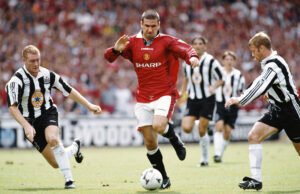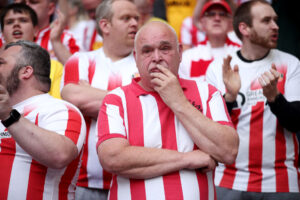The book opens with a haunting scene. As the Manchester United team file out onto the pitch, we find that they are not in their usual red strip. “They came out of the tunnel like a ghost train, all in white, into the Highbury afternoon gloom.” Matt Busby’s team are wearing black armbands, following the death of one of the club’s directors. In just under a week, four of the starting 11 that day would be dead.
While David Peace’s Munichs, published this month, centres on one of English sport’s worst tragedies — when, on 6 February 1958, a plane taking Manchester United back home from a European match crashed on take-off at Munich airport, leaving 23 passengers dead, including eight players — his setting is broader.
This is a story of Fifties England, regarded by the nostalgic as football’s golden age. It is also a story of modern England, a reflection on what we have lost.
These were the days when the game was dominated by clubs in the industrial heartlands of northern England and the Midlands. Wolverhampton Wanderers, one of the founding clubs in the Football League, won three titles that decade and beat some of Europe’s best in floodlit games televised by the BBC. TV ownership boomed in the coronation year of 1953, allowing the nation to watch two Lancashire clubs, Blackpool and Bolton Wanderers, contest that year’s FA Cup final. The sport of the industrial working class had become the national game and the country had never felt more united.
It was in the mid-Fifties, as “austerity Britain” turned into “modernity Britain”, that a young Manchester United team emerged to rival Wolves for glamour. The press began calling them “the Busby Babes”. When the Irish football broadcaster and former Manchester United player Eamon Dunphy first saw them as a youngster, he was struck by their “trim and dashing” modern V-necked red shirts. As he describes in his biography of Matt Busby, A Strange Kind of Glory, the Busby Babes were “unearthly, handsome creatures from another planet, more heroic than any movie star we’d seen or could imagine”. Football fans crowded grounds to see them play.
When news of the crash broke, millions followed the reports on their televisions. A stoical nation was broken. There was some initial cause for hope: Duncan Edwards, the 21-year-old shining star of the team, already capped by England 18 times, clung to life in hospital for 15 days. In Peace’s prose, sometimes sentimental, always heartfelt, Edwards was “a magnificent boy, always cheerful, always smiling, always ready for a laugh and a giggle; he was a lovely lad, and now he was gone”.
As the mourning begins in this powerful and moving story, Peace sees colour being drained from the nation. On the day of Edwards’s funeral in Dudley, he writes: “That Black Wednesday in the Black Country, the world was white at first that day, with sleet, with snow, but then was turned to grey and black and into slush and mud by the thousands upon thousands.” But the generosity of this novel lies in its refusal to elevate one player above another, a democratic style and spirit that is both intrinsic to how Peace writes and in tune with the team he describes. “We don’t like picking out individuals at Old Trafford,” is how Jimmy Murphy puts it, the Manchester United coach who had the grim task of putting together a new team after the crash.
The approach can be demanding on the reader. Munichs skips none of the funerals, including those of the club officials and football reporters who died in the disaster, and we are made to feel each loss, in all its draining detail. Precise funeral routes are to Munichs what league tables and crowd figures are to The Damned Utd (2006) and Red or Dead (2013), Peace’s earlier football novels.
Matt Busby survived the disaster but did not want to go on living. He was unable to forgive himself for taking the club into Europe and for not protesting when the pilot insisted on another attempt at take-off. The book has him attending his first match after the crash, still on crutches, but he can’t see the game properly for the “young, red ghosts”.
I picked up Munichs sure that its redemptive climax would be Manchester United’s European Cup final triumph of 1968. That revival, the greatest story in English club football, came 10 years after the tragedy. It was the day when another scarred survivor, Bobby Charlton, fell onto Matt Busby’s chest in tears, the day when the ghosts of Munich were laid to rest.
For David Peace, though, the climax comes three months after the crash, that same season, when Manchester United reached the FA Cup final. The story he tells is one of overcoming and of hope. It includes the less celebrated role of Jimmy Murphy, right-hand man to Busby, who carried his own guilt for not being on the fatal flight. The new team he assembled was made up of reserve players — some who’d carried their teammates’ coffins — untried teens and the few traumatised survivors. Getting to Wembley should have been impossible.
Manchester United were carried to that final on a wave of popular emotion. It wasn’t just the city behind them, it was a nation. That feeling was still there, 10 years later, when they became the first English team to win the European Cup in 1968. If some accounts are to be believed, the moment was celebrated as enthusiastically across the country as England’s World Cup triumph two years earlier.
The choice of title for the novel is a curious one to me. As a more partisan and aggressive fan culture took hold in the Seventies, “Munichs” became a collective term of abuse for all Manchester United fans, just as chants of “Munich 58” and “Who’s that dying on the runway?” would be directed against them. Liverpool fans were the most persistent offenders, resentful of what they saw as a media obsession with their by then inferior rivals and apparently forgetting that Matt Busby had once played for Liverpool. Astonishingly, Manchester City fans did the same.
Something had become twisted in the people’s game. One night in May 1985, 39 fans died in Heysel Stadium after a charge by Liverpool supporters. As the cameras ranged across the wreckage after the riot, flags with the slogan “Munich 58” were still proudly displayed on the terraces. Liverpool fans only stopped singing about Munich after the Hillsborough disaster.
In The Game of our Lives (2014), David Goldblatt suggested that the post-war image of the English as a “big national football family” was a “cosy” one. Peace’s novel is saved from a cosy nostalgia, an idealisation of an age, by portraying some of the harsher sentiments present even in those days. On a visit to Burnley, soon after the crash, Manchester United players faced abusive chants. “IT’S A PITY THEY DIDN’T ALL DIE!” Following the game, Burnley’s chairman, Bob Lord, suggested Manchester United should remember that there were other clubs in football and not just them.
Munichs will no doubt provoke thoughts about today’s game. Reading about Tommy Taylor, who came to Old Trafford from a Yorkshire pit village with his football boots wrapped in brown paper and an “earnest desire to want, to really, really bloody fucking want to play for Manchester United”, makes you want to press the novel into the hands of the some of the red-shirted multi-millionaires who have strolled the pitch in recent years, looking like they felt they should be somewhere better.
But the passing of a more dignified, self-effacing footballing age is perhaps not the principal regret of this novel. Reading Munichs, I found myself thinking back to an earlier David Peace novel, GB84 (2004), his epic story of the Miners’ Strike set a generation on from the Munich disaster. As well as being the “backbone of the nation”, the mining industry was the backbone of British football success, giving us the three greatest managers of the post-war era: Bill Shankly, Jock Stein and Matt Busby. GB84 shows how the miners were turned into the “enemies of the people”, how entire communities — those that gave us three of the Munich dead as well as Bobby Charlton, perhaps the greatest of English footballers — were criminalised and brutalised and never recovered from the traumatic blows.
In the Eighties, football looked like it would be going the same way as the industrial towns — down. Today, the game thrives even in “left-behind” places like Bolton, Burnley and Stoke. Match attendances across the country are at levels not seen since the early-Fifties. As Jonathan Wilson recently observed, football is a source of civic pride and belonging, “pretty much the only marker of identity” when “there is nothing else”.
This is a troubling thought. The rich associational culture of post-war England, with its high level of engagement in political parties, friendly societies and churches, has long disappeared, and the public realm has been hollowed out further in the years of austerity. The destruction of Spellow library in Liverpool during the recent rioting provoked outrage, but since 2010 a fifth of all public libraries have been closed by hard-pressed local authorities with little protest. In our impoverished social and cultural landscape, with populist and anti-immigrant parties filling the void, it can seem that football is the only positive thing to bring people together.
Buried within David Peace’s story of a devastated football club is this idea of a greater loss: of solidarity and collective feeling. He is not only remembering a past era, when the English working class was held in high esteem, but writing for today. We can only hope that, within the wreckage of the past and the story of the rebuilding of a football team, there might lie inspiration for the present.
Disclaimer
Some of the posts we share are controversial and we do not necessarily agree with them in the whole extend. Sometimes we agree with the content or part of it but we do not agree with the narration or language. Nevertheless we find them somehow interesting, valuable and/or informative or we share them, because we strongly believe in freedom of speech, free press and journalism. We strongly encourage you to have a critical approach to all the content, do your own research and analysis to build your own opinion.
We would be glad to have your feedback.
Source: UnHerd Read the original article here: https://unherd.com/



